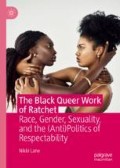Abstract
I have thus far discussed the layers of cultural and sexual politics that revolve around the word ratchet, the way BQW utilize the Black Ratchet Imagination to remake Black cultural spaces for the expressed purposes of honoring their own pleasure, and what it means for BQW to embody ratchet ways of being as middle-class and class mobile BQW subjects. In this chapter, I hone in on the way BQW create representations which are situated within the ratchet/boojie politics of the Scene. How do they engage in the production and dissemination of cultural artifacts that might represent BQW as ratchet/boojie? And what is at stake when those representations position BQW as ratchet/boojie? In the previous chapter, I discussed a strip club transformed into a ratchet scene space for BQW. BQW queered hip-hop esthetics, Black youth culture, and explicit Black female sexuality, effectively transforming the structures of feeling such that it was Black female same-sex desire that reigned in contexts (the strip club and hip-hop songs) where BQW’s desire is typically foreclosed. Just as BQW have found ways of reorganizing space and queering Black cultural formations in ways that allow them to be seen and heard on their own terms, I consider another tool BQW employ to make themselves both seen and heard: YouTube.
Access this chapter
Tax calculation will be finalised at checkout
Purchases are for personal use only
Notes
- 1.
In DC, “white-shirts” refer to ranking officers.
- 2.
I want to note here that I’m using the language that is used in the show and the comments sections. Masculine women are referred to as either studs/doms, and feminine presenting women as fems.
- 3.
Or, as it is colloquially known, “wife-beater.”
- 4.
These comments from Season 1, Episode 1 of District Heat. Using the computer program NVivo, I was able to pull all the comments from all 10 available episodes of District Heat, code and analyze them.
- 5.
Available for analysis at the time of this analysis and writing.
- 6.
Or “stud-on-stud” though that is considerably less likely in general given the way that such relationships are generally frowned upon in Black lesbian communities. See Mignon R. Moore (2006), Laura Lane-Steele (2011), and the 2015 documentary The Same Difference by Nneka Onuorah which address gender roles and performances in Black lesbian communities.
- 7.
Colloquially referred to as a “69” position.
- 8.
Internet lingo for “What the Fuck?”
- 9.
A Black queer colloquial way of referring to an “Aggressive” woman which is another way of saying “stud” or “dom.”
- 10.
Oddly, she very rarely uses contractions which might demonstrate a “forced” Standard American English. In other words, she may be using SAE as a means of masking her actual class position, and thus engaging in boojie behavior.
References
DeClue, Jennifer. 2011. Lesbian Cop, Queer Killer: Leveraging Black Queer Women’s Sexuality on HBO’s The Wire. The Spectator 31 (2): 53.
Johnson, E. Patrick. 2003. The Pot is Brewing: Marlon Riggs’ Black Is… Black Ain’t. In Appropriating Blackness: Performance and the Politics of Authenticity. Durham and London: Duke University Press.
Johnson, Amber, and Robin M. Boylorn. 2015. Digital Media and the Politics of Intersectional Queer Hyper/In/Visibility in Between Women. Digital Media 11: 1.
Lane, Nikki. 2011. Black Women Queering the Mic: Missy Elliot Disturbing the Boundaries of Racialized Sexuality and Gender. Journal of Homosexuality 58 (6–7): 775–792.
Lane-Steele, Laura. 2011. Studs and Protest-Hypermasculinity: The Tomboyism within Black Lesbian Female Masculinity. Journal of Lesbian Studies 15 (4): 480–492.
Miller-Young, Mireille. 2014. A Taste for Brown Sugar: Black Women in Pornography. Durham: Duke University Press.
Moore, Mignon R. 2006. Lipstick or Timberlands? Meanings of Gender Presentation in Black Lesbian Communities. Signs 32 (1): 113–138.
Moore, Marlon Rachquel. 2015. Between Women TV: Toward the Mainstreaming of Black Lesbian Masculinity and Black Queer Women in Community. Black Camera: The New Series 6 (2): 201–216.
Sullivan, Laura L. 2000. Chasing Fae: The Watermelon Woman and Black Lesbian Possibility. Callaloo 23 (1): 448–460.
Williams, Linda. 1999. Hard Core: Power, Pleasure, and the “Frenzy of the Visible”. Expanded ed. Berkeley: University of California Press.
Author information
Authors and Affiliations
Rights and permissions
Copyright information
© 2019 The Author(s)
About this chapter
Cite this chapter
Lane, N. (2019). Representing Ratchet: Screening Black Lesbian Sex and Ratchet Cultural Politics. In: The Black Queer Work of Ratchet. Palgrave Macmillan, Cham. https://doi.org/10.1007/978-3-030-23319-8_4
Download citation
DOI: https://doi.org/10.1007/978-3-030-23319-8_4
Published:
Publisher Name: Palgrave Macmillan, Cham
Print ISBN: 978-3-030-23318-1
Online ISBN: 978-3-030-23319-8
eBook Packages: Literature, Cultural and Media StudiesLiterature, Cultural and Media Studies (R0)

